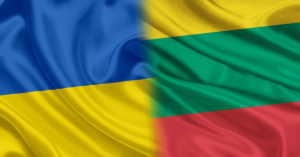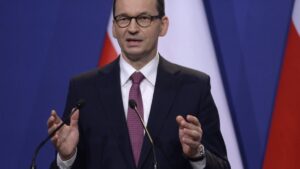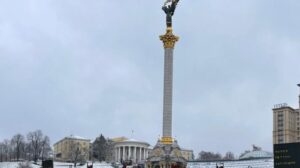
Ukraine’s largest coffee chain Aroma Kava has officially expanded its presence on the international market and opened a new coffee shop in Warsaw, Forbes Ukraine reports.
“The chain will be developing in Poland based on a franchise model. The first franchise partners are Ukrainians who have been living in Poland for a long time,” Aroma Kava co-investor Gennady Gaydabura told the publication.
Aroma Kava offers several formats of cafes. The most compact ones occupy only 6-9 square meters, while large cafes are located in premises up to 150 square meters.
The first Aroma Kava in Poland started its work at 136 Marshalkowska Street in the premises that used to house a Subway restaurant. A Carrefour supermarket and a Millennium Bank branch are located next door to the coffee shop. The Warsaw location represents one of the largest formats of the chain. According to Aroma Kava representatives, the cost of opening a coffee shop in Poland is 30-40% higher than the investment in a Ukrainian one.
The coffee shop in Warsaw is not the first attempt by Aroma Kava to enter the international market. In 2020, the chain opened a franchise in the center of Minsk, but it stopped working with the outbreak of a full-scale war. The company made its second attempt to expand abroad in January 2023. A franchise coffee shop was opened in the student district of the Bulgarian capital Sofia. According to the chain’s website, Aroma Kava was registered in 2013 and has more than 350 coffee shops in 45 cities of Ukraine. The chain’s baristas prepare over 1 million cups of coffee per month.

Poland is becoming an increasingly popular destination for real estate investment among foreigners. This is due to economic stability, a growing real estate market and attractive prices. In this article, we will look at the peculiarities of buying and selling real estate in three key Polish cities: Wroclaw, Krakow and Warsaw.
Wroclaw: The city of a thousand bridges
Buying real estate in Wroclaw
Wroclaw, with its rich history and cultural heritage, is one of the most attractive cities for investment. Buying real estate in Wroclaw offers a variety from historic buildings in the city center to modern apartments in new residential complexes.
– Prices: The average price per square meter in Wroclaw ranges from 7000 to 11000 PLN, depending on the neighborhood and the condition of the property.
– Buying process: The process begins with selecting a suitable property, checking its legal purity and finalizing the transaction through a notary.
Additional costs such as purchase tax (2%) and notary fees should also be taken into account.
Real estate for sale in Wroclaw
Selling real estate in Wrocław can be profitable, especially if the property is located in a prestigious area or has unique characteristics.
Preparation for sale: It is important to properly prepare the property for sale by making the necessary repairs and putting it in an attractive condition.
Marketing: Effective marketing, including professional photos and advertising on popular platforms, can significantly speed up the sale process.
Krakow: The cultural capital of Poland
Buying real estate in Krakow
Krakow is known for its old town and universities, which makes it attractive for students and tourists. Buying real estate in Krakow can be a great investment for both living and renting.
– Prices: The average price per square meter in Krakow is between 8000 and 12000 PLN.
– Buying process: Buying real estate in Krakow requires a thorough check of the documents and the legal purity of the property. Notary fees and purchase tax should also be taken into account.
Selling real estate in Krakow
Selling real estate in Krakow can be particularly lucrative due to the constant demand from students and tourists.
– Preparing for the sale: Before putting a property up for sale, it is important to assess the market value and, if necessary, improve the condition of the property.
– Marketing: Placing ads on popular websites, using social media and professional photography will help attract more potential buyers.
Warsaw: The capital and economic center of Poland
Buying real estate in Warsaw
Warsaw, as the capital of Poland, attracts investors from all over the world. Many international companies have their headquarters here, which makes the real estate market very active.
– Prices: The average price per square meter in Warsaw varies from 9000 to 15000 PLN.
– Buying process: Buying real estate in Warsaw requires attention to detail and legal aspects. It is recommended to use the services of professional realtors and lawyers.
Selling real estate in Warsaw
Selling real estate in Warsaw can be very profitable, especially in central areas and areas with good infrastructure.
Preparation for sale: High-quality preparation of the property, including renovation and decoration, will help to increase its attractiveness.
– Marketing: The use of various marketing channels, including online platforms and social media, will help to reach a wide audience.
Conclusion.
Buying and selling real estate in Wroclaw, Krakow, and Warsaw has its own peculiarities, but in all cases it is important to take into account legal aspects, market trends, and effective marketing strategies. Whether you are looking for a home for yourself or an investment, Poland offers many opportunities for successful real estate transactions.

Ukraine and Lithuania intend to resume passenger rail transportation on the Kyiv-Warsaw-Vilnius route, move veterinary and phytosanitary inspections of transit cargo from Ukrainian-Polish border crossings to the port of Klaipeda, and start Ukrainian airlines flying from the country’s airports, Deputy Minister of Community, Territorial and Infrastructure Development Oleksandra Azarkhina wrote on Facebook.
According to her, these issues were discussed at a meeting of the Intergovernmental Ukrainian-Lithuanian Commission on Trade, Economic, Scientific and Technical Cooperation chaired by Deputy Prime Minister for the Reconstruction of Ukraine and Minister of Community Development, Territories and Infrastructure Oleksandr Kubrakov and Minister of Economy and Innovation of the Republic of Lithuania Aushrine Armonaitė.
“Regarding cooperation in the transport sector, we discussed the main directions of restoring and expanding transport links between Ukraine and Lithuania. Namely: the possibility of resuming passenger transportation by rail and further development of the Kyiv-Warsaw-Vilnius route; bilateral cooperation with the involvement of EU institutions to include Yahodyn-Dorogousk in the Trans-European Transport Network; transfer of veterinary and phytosanitary inspections of transit cargo from Ukrainian-Polish border crossings to the port of Klaipeda; development of new routes for the transportation of goods through Poland, which will increase cargo turnover and expand the range of railroad services.
It is noted that, according to the Lithuanian side, the facilitation of procedural requirements at the Ukrainian-Polish border will allow transporting up to 500 thousand tons of Ukrainian agricultural products per year to the port of Klaipeda. Lithuania also plans to install bogie change terminals for railroad tracks, which will also help increase cargo turnover between the two countries.
In addition to the development of railway communication, the Lithuanian side suggested that Ukrainian airlines consider starting operations in Lithuania and participating in national tenders for strategic destinations.
“We have agreed to deepen cooperation in the aviation sector and hope to resume air travel between Lithuania and Ukraine in the near future,” Azarkhina wrote.
Earlier, Lithuania confirmed the need for the EU to subsidize the transportation of Ukrainian grain through Klaipeda.
KYIV, LITHUANIA, passenger rail transportation, UKRAINE, VILNIUS, WARSAW

Polish Prime Minister Mateusz Morawiecki assured on Wednesday that Warsaw does not intend to open borders for agricultural products from Ukraine. “We are protecting our agriculture, so we are not opening the borders for agricultural goods from Ukraine,” Polish Radio quoted him as saying Wednesday.
“The war in Ukraine is having an increasingly serious impact on the agricultural market, and this has a negative impact on Poles, so we have imposed an embargo on goods from Ukraine,” Morawiecki said.
He admitted that “in a couple of months, the EU intends to reopen the borders for grain imports from Ukraine.”
“We do not agree to this, we will not open the borders and we will not allow destabilization of our economy. We are obliged to protect Polish interests and our agriculture,” the Polish Prime Minister emphasized.
Polish Agriculture Minister Robert Telusz said that the meeting of agricultural ministers reached an agreement and signed a petition to extend the ban on imports of four grains from Ukraine until the end of 2023.
“The restriction of grain imports from Ukraine has not affected transit. In February, corn transit amounted to 114,000 tons and in June 260,000 tons. Therefore, the European Commission’s decision to open the borders on September 15 is not meaningfully justified,” the Polish Agriculture Ministry quoted Telusz as saying on Twitter.
According to the Polish minister, the ministers of Ukraine and Moldova were invited to the meeting of agricultural ministers in Warsaw, but they could not come for objective reasons. The Polish minister expressed hope for a meeting in the future.
“We want to help Ukraine in transit. We know that this war is a war that we have to win,” Telusz said and added that it will be won when solutions will be “implemented that will help us in this.”
Poland, Hungary, Slovakia, Bulgaria and Romania, in agreement with the European Commission (EC), have banned imports of wheat, corn, rapeseed and sunflower seeds from Ukraine since May 2.
Problems for agricultural producers from a number of European countries associated with the surplus of Ukrainian grain and other agricultural products in the markets of Eastern Europe began in the first months of 2023. In many respects, they were provoked by the temporary abolition of customs duties on imports of grain and oilseeds from Ukraine by the EU. Due to this measure by Brussels, imports of agricultural products from Ukraine to the border states increased significantly.
Ukrainian products, in particular, grain, sunflower, eggs, poultry meat, sugar, apples and apple juice, berries, flour, honey and pasta in unprecedented quantities began to settle on the shelves in these countries, which led to a sharp drop in prices and hit hard the farmers in these countries.
Meanwhile, as First Deputy Prime Minister and Minister of Economy and Trade Yulia Sviridenko said on Wednesday at a meeting with the European Business Association (EBA), Ukraine is categorically against the extension of the EU’s discriminatory ban on the supply of a number of agro-commodities to Poland, Hungary, Slovakia, Bulgaria and Romania after September 15.
According to her, the ban on exports of wheat, barley, rapeseed and sunflower seeds to the above five countries is “discriminatory on the part of the nearest neighbors, especially when Ukraine has an enemy at sea.”
Asked what would happen if the ban was still extended, the first deputy prime minister said that in such a case Ukraine would be forced to consider mirror measures.
“I would not like to say out loud and believe that this is a realistic step, but we think that some mirror measures can be applied,” Sviridenko said.

“Ukrzaliznytsia” (UZ) is launching a test flight of the “Kyiv-Warsaw” train with standard “wide” passenger cars in order to obtain the Polish side’s final permission to increase the number of trips and, respectively, seats on this route by two or three times, the press service of UZ said.
According to its data the purpose of the test is to confirm the compatibility of standard passenger cars of UZ with the modernized infrastructure of Polish Railways. The current stage of the project is the final one.
On Wednesday, May 31, 14 standard passenger cars of size 1-BM leave Kiev, which in Jagodina will be converted to euro bogies for “narrow” europeways (1435 mm).
“During my first trip to Poland as chairman of the board of Ukrzaliznytsia in the delegation headed by Deputy Prime Minister for Reconstruction of Ukraine – Minister of Development of Communities, Territories and Infrastructure Alexander Kubrakov, we agreed to finalize this project. Earlier, all the tests were carried out, and we realized: our standard cars can freely pass the test run, after which we will get the “green light” from the Polish side. This will allow in two or three times to increase the supply of seats for direct communication between the Ukrainian and Polish capitals, “- quoted in a press release, the head of the board of UZ Eugene Lyashchenko.
Reportedly, UZ has already engaged all RIC-class cars in its fleet (Regolamento Internazionale Carrozze – Italian). In addition, the company asked European partners to transfer new “narrow” cars, but it will take more than two years to order and build such cars. “This did not stop Ukrainian railroad workers, as the demand of our passengers prompts them to find non-standard solutions. Almost a year ago UZ initiated and conducted work with Polish railroad workers on this project realization”, – words of the UZ board member Alexander Pertsovsky are cited in the report.
There were several rounds of negotiations and agreements between the two sides on the issue of compatibility, received technical approval of the Polish regulator UTK (Urząd Transportu Kolejowego). At the request of the Polish side, measurements of the dimensions of each car were carried out jointly.
As noted, the number of seats on the direct flight of the train “Kyiv-Warsaw” is limited at the moment, as the Polish railroaders let in only a train equipped with “narrow” RIC-cars with three-seat compartments.
According to the press service, the direct flight Kiev-Warsaw-Kiev continues to enjoy a rush demand. “Every day only in the mobile application UZ registers more than 3 thousand requests from passengers who are looking for tickets in this service, which is 10 times more than the availability of seats,” – states the company.
As reported there are 42 RIC cars in the fleet of UZ, two of which have been purchased from Krukiv Wagon Works.
In order to increase the number of trips to Poland from Ukraine after the full-scale invasion of Russia, UZ has launched new routes. In particular, “wide” routes have been retained on the route from Kiev to Chełm. Two daily flights conveniently connect with Polish flights to Warsaw. There are also night flights between Kiev and Peremyshl (two sleeper flights in addition to the two Intercity+ flights). Direct flights are launched from Kharkiv to Chelm, from Zaporizhzhya, Dnipro, Odessa, Vinnitsa, Khmelnitsky, Ternopil and Lviv to Peremyshl.

The mayors of Warsaw, Prague, Budapest and Bratislava are visiting Kiev, the Polish TV channel Polsat News has reported.
Details of the mayors’ visit to the Ukrainian capital are not yet known.
According to media reports, this is the first visit of Warsaw Mayor Rafal Trzaskowski to Kiev after the war started.
On February 15, 2022, Trzaskowski, accompanied by Prague mayor Zdenek Grzyb on behalf of the Pact of Free Cities went to meet with Kiev mayor Vitaliy Klitschko.